Trying to decide between WooCommerce vs Shopify for your eCommerce store?
These two are the biggest eCommerce platforms by far and both can help you build a great-looking, effective eCommerce store.
But while they have a lot of similarities, there are also some very important differences between Shopify and WooCommerce.
In our Shopify vs WooCommerce comparison, we’re going to try to highlight those important differences so that you can choose the right platform for your situation.
We’re not going to pick a single “winner” because both can be good options. It really just depends on your unique use case.
If we had to sum up the conclusions of this post, here’s the main gist:
- Shopify is probably the better option for most “regular” stores. It has enough functionality for most eCommerce stores and you can just focus on growing your store because Shopify handles all the technical stuff for you.
- WooCommerce might be the better option for people with unique needs that value customizability. You can make WooCommerce do whatever you need it to, which isn’t always the case with Shopify. However, it’s a bit more complicated, so you should only use it if you need that extra control.
Our overall recommendation for most people is to use Shopify, but that doesn’t mean your specific use case wouldn’t be better off with WooCommerce.
Keep reading to learn more about WooCommerce and Shopify and where those recommendations came from…
WooCommerce vs Shopify: Quick Summary
If you’re in a rush, here’s a basic Shopify vs WooCommerce comparison table that summarizes some of the key conclusions from our post.
| WooCommerce | Shopify | |
| Overall | Best for stores with unique needs | Best for most “regular” stores |
| Basic Approach | Self-hosted, open-source software powered by WordPress | Hosted SaaS (software as a service) – closed-source |
| Setup Process | Install on your own hosting | Super easy – just register for an account |
| General Ease of Use | Not too bad, but a small learning curve | The simplest way to make a store |
| Design and themes | Thousands of themes and tons of design options. Customize using code or visual builders | Lots of themes, but not as many or as flexible as WooCommerce. Customize using Shopify OS 2.0 |
| App / plugin availability | Largest extension marketplace (and they’re usually cheaper) | Lots of options, but not as many as WooCommerce (and usually more expensive) |
| Code Access / Customizations | Full access to underlying source code for modifications | Limited code access |
| Payment options | Full flexibility to use any gateway with no added fees | Not as many gateways and Shopify charges extra if you don’t use Shopify Payments |
| Search engine optimization | Very strong via WordPress SEO plugins – better for programmatic SEO | Powerful enough for most stores but not as flexible as WooCommerce |
| Blogging | The best blogging platform because it’s powered by WordPress | Fine for basic blogs, but much more limited |
| Security | You’re responsible for securing your store | Shopify handles security for you |
| Customer support | Community support or pay for a support service | Direct support from the Shopify team |
| Pricing | WooCommerce can be cheaper, but not always | Shopify is often a little more expensive, but not always |
WooCommerce vs Shopify: The Basic Approach
To kick off our WooCommerce vs Shopify comparison, let’s quickly run over the key difference in approach that these two tools use.
WooCommerce

WooCommerce is open-source, self-hosted software that you can use to create an eCommerce store based on the popular open-source WordPress software.
WordPress is by far the most popular way to make any type of website, powering over 43% of all websites on the internet.
With the WooCommerce plugin for WordPress, you can extend WordPress and turn it into a fully functioning eCommerce store.
Because both WordPress and WooCommerce are open-source software, you have full access to all of your site’s code and the sky’s the limit when it comes to customizations.
Of course, the tradeoff is that you’re also responsible for maintaining and securing your store, because you’re the one hosting the software.
The basic process to create and run a WooCommerce store goes like this:
- Purchase your own web hosting.
- Install the WordPress software (many hosts will pre-install it for you or let you do it with one click).
- Install the WooCommerce plugin on WordPress, which is super simple (some hosts will pre-install WordPress and WooCommerce at the same time).
- Build your store.
- Apply software updates as needed and perform basic maintenance (or hire some type of managed service to do it for you).
You don’t need to be a developer to do any of that – but it’s definitely a little more complex than Shopify.
Shopify

Shopify is a hosted SaaS (software as a service) tool that you can use to create an eCommerce store.
Unlike WooCommerce, Shopify does not require you to purchase your own web hosting or install any software – you just sign up for a Shopify account and start building.
However, also unlike WooCommerce, Shopify is a closed-source tool, which means you don’t get access to your store’s underlying source code and you’re only able to make the customizations that Shopify allows you to make.
For most stores, that tradeoff is fine because the simplicity of Shopify’s SaaS approach outweighs any loss of flexibility.
With Shopify, the basic process to create and run a store goes like this:
- Register for a Shopify account.
- Build your store.
General Ease of Use (Store Management)
While the setup process at Shopify is simpler than WooCommerce, WooCommerce is still simple enough for a non-technical user to set up.
Once you’ve created your store, both WooCommerce and Shopify give you a code-free dashboard to manage every part of your store.
With WooCommerce, though, you’ll work from inside the regular WordPress dashboard, which might be a plus if you’re already familiar with WordPress (but equally could be a negative if you’ve never used WordPress before).
Here’s a look at a few key interface areas in both to give you a general idea of what store management is like.
Main Dashboard Page/Welcome Wizard
WooCommerce:
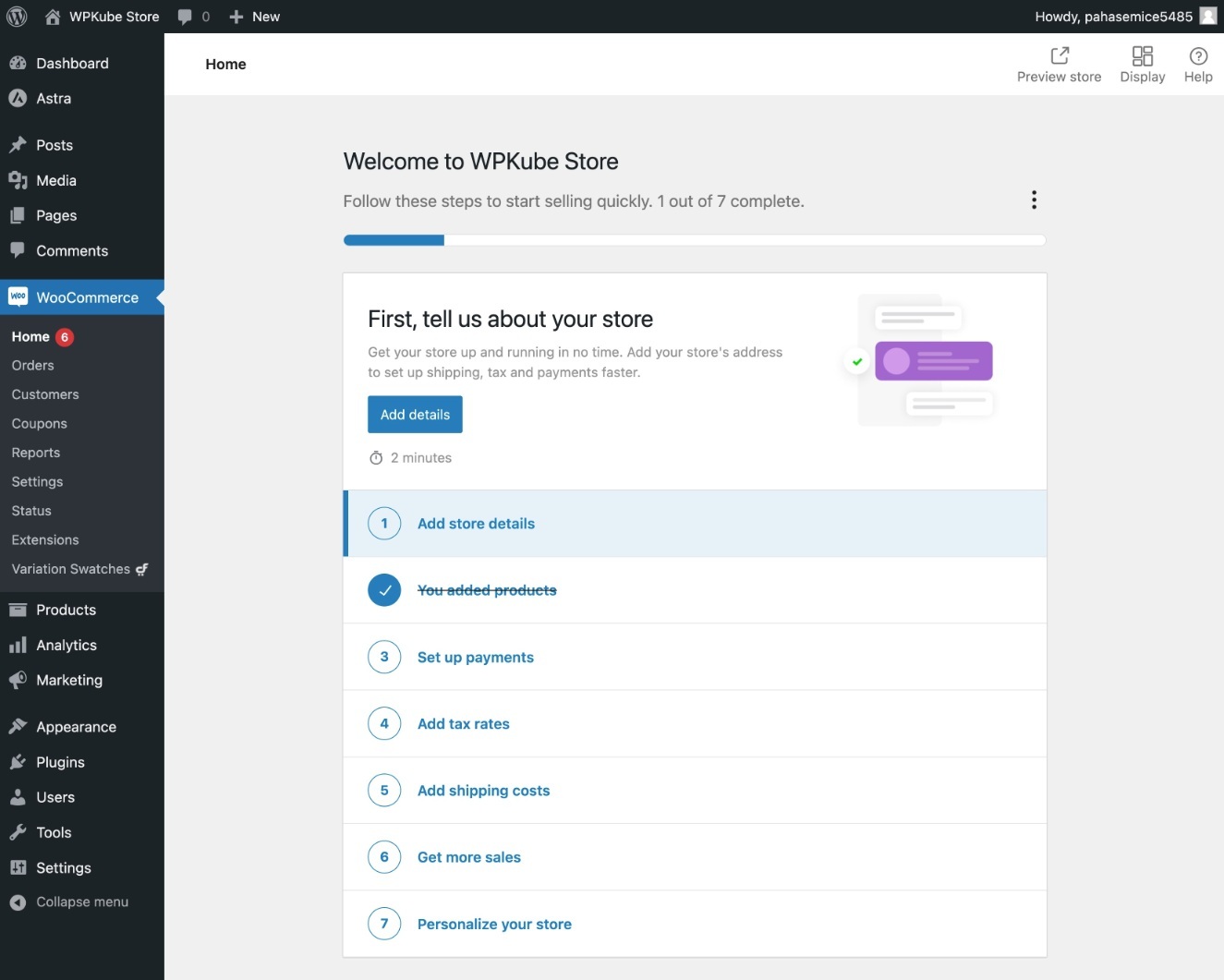
Shopify:
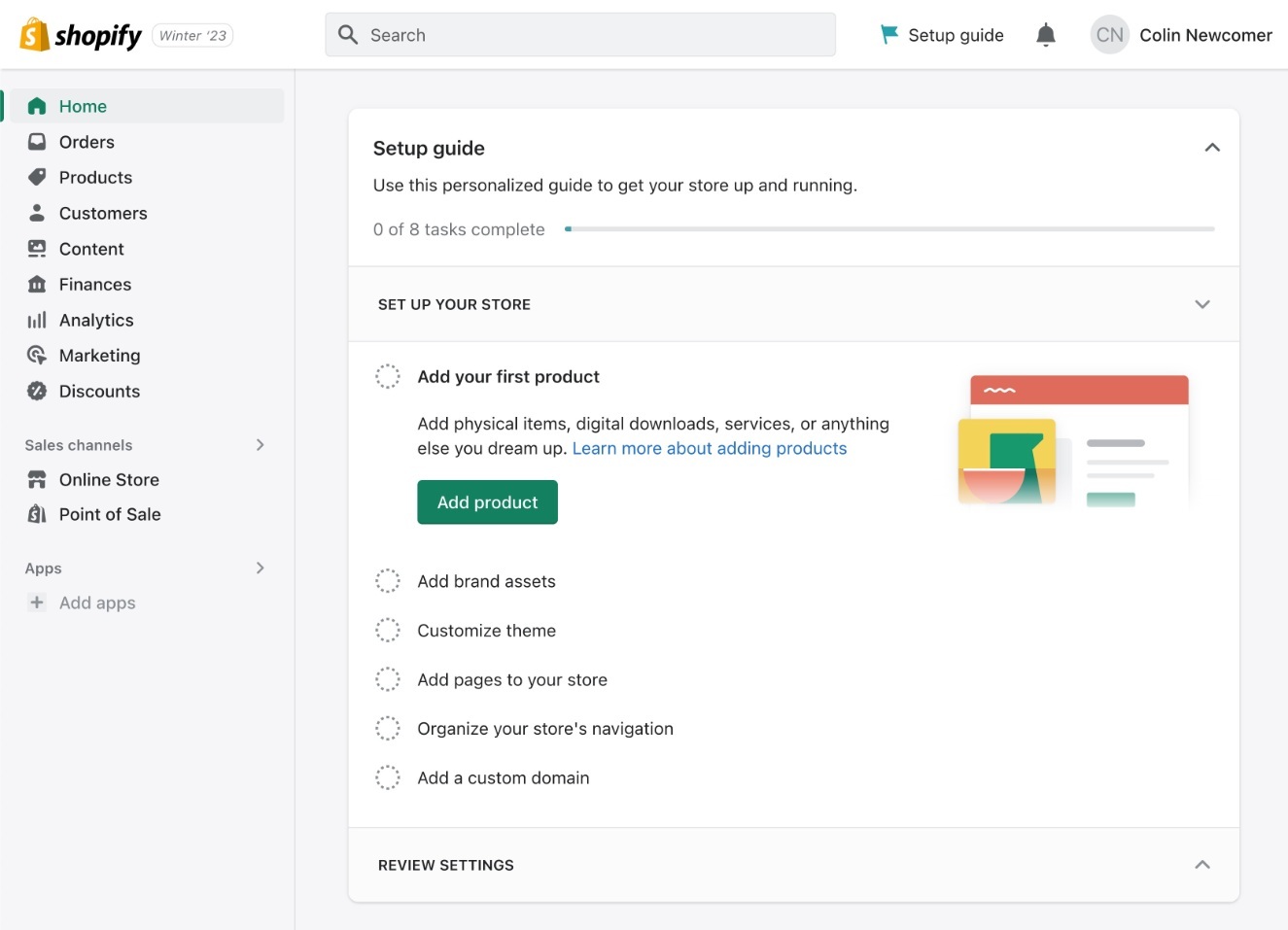
Add Product Interface
WooCommerce:
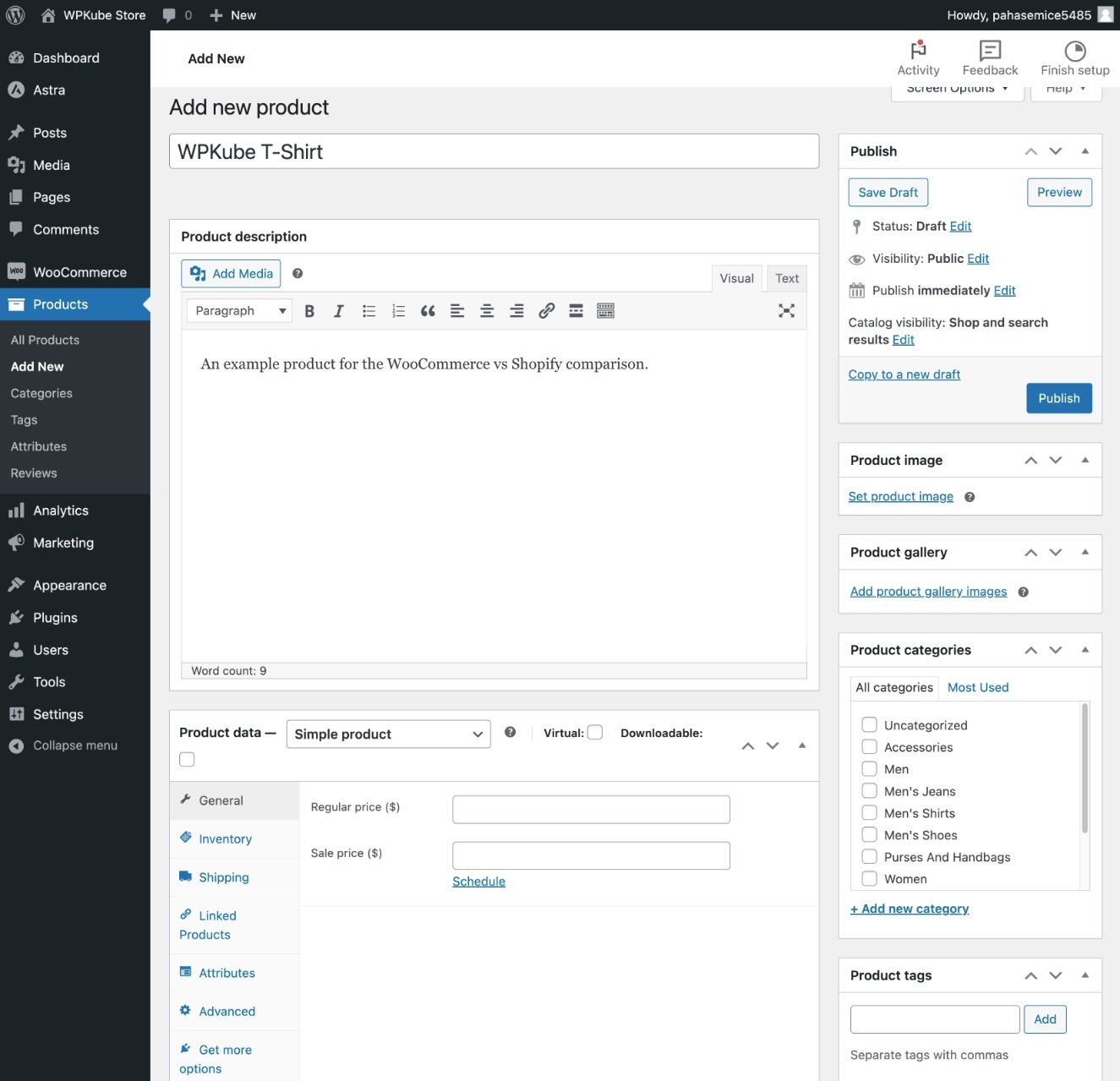
Shopify:
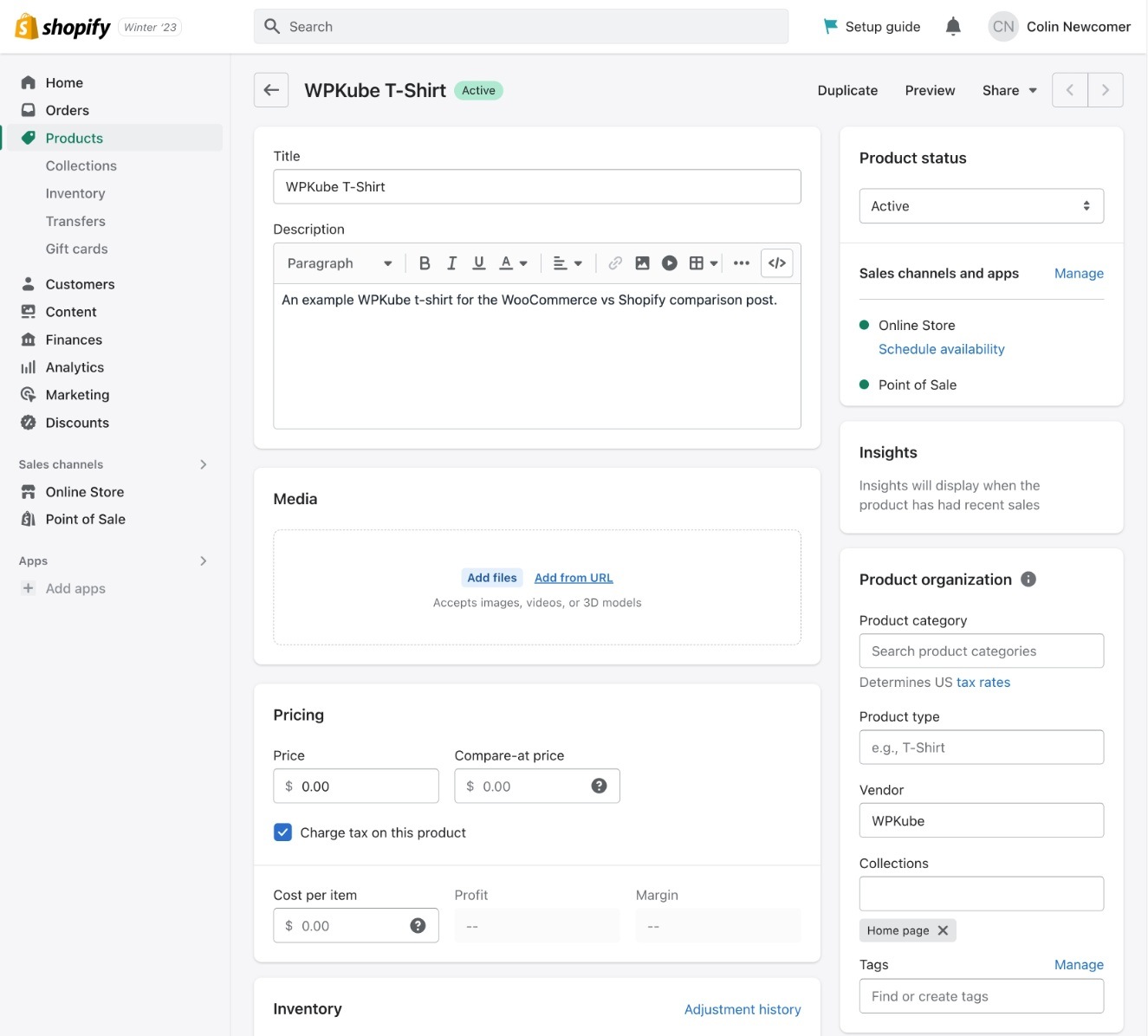
Coupon Creation Interface
WooCommerce:
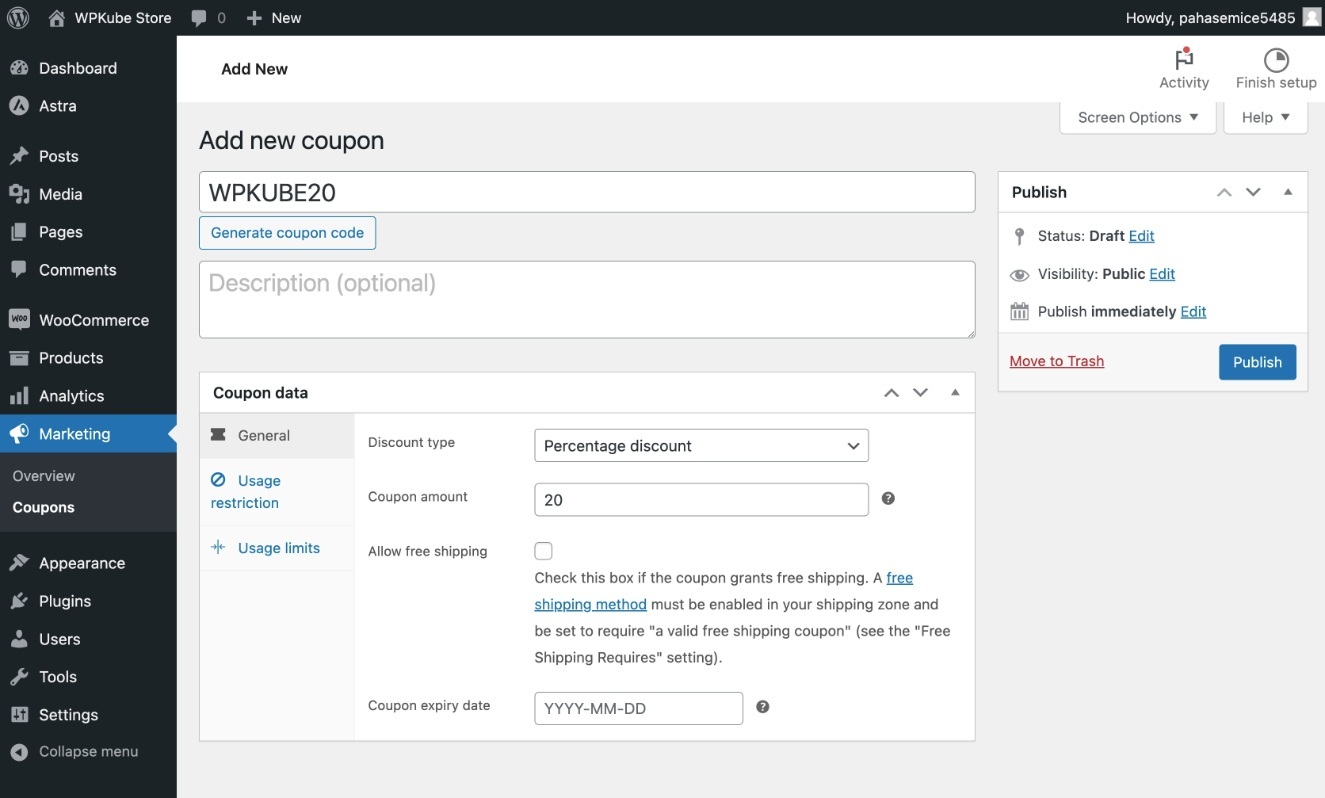
Shopify:
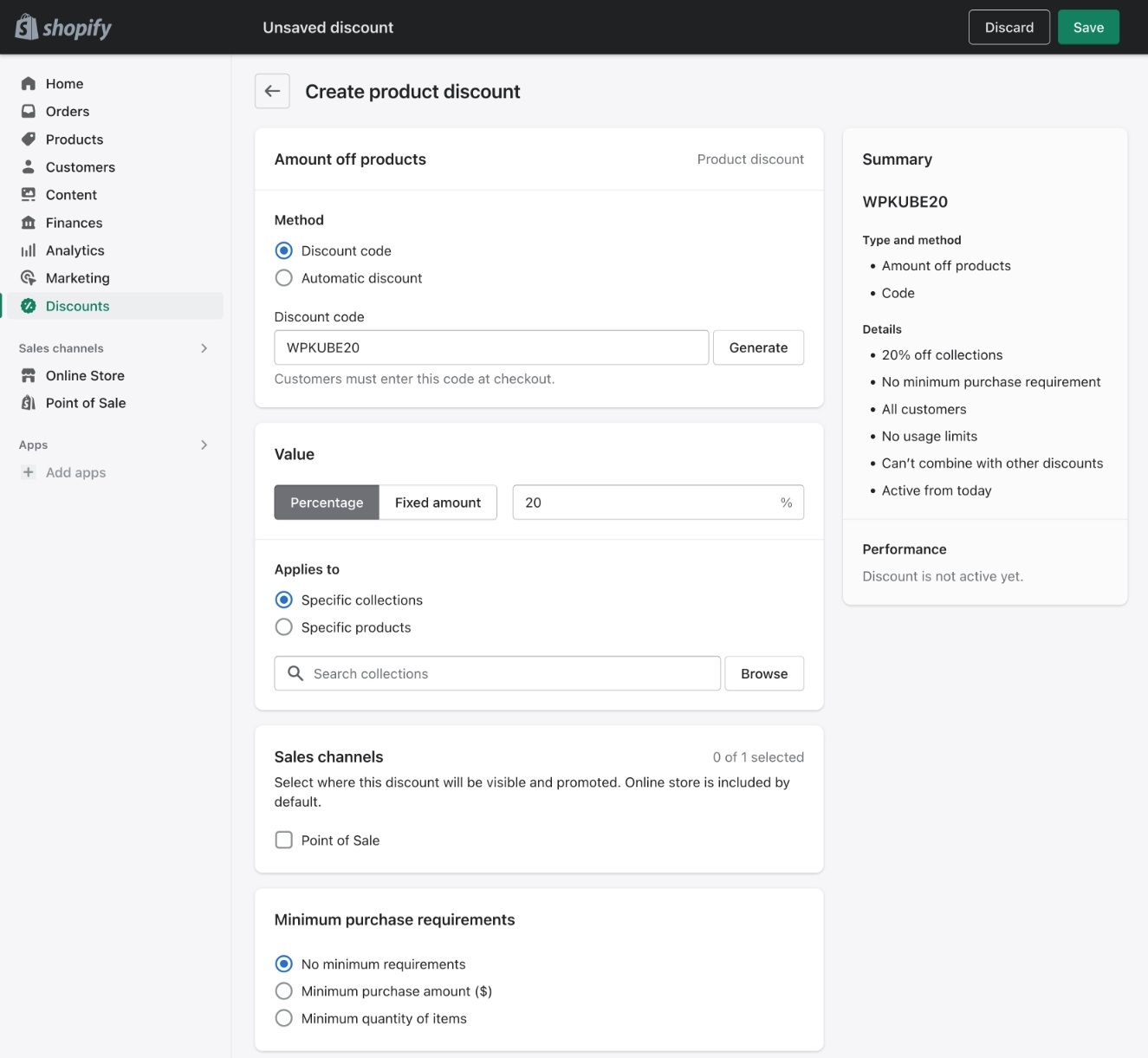
Theme Availability (Store Design)
To help you customize the look of your store, both WooCommerce and Shopify let you use official and third-party themes.
Both WooCommerce and Shopify offer a wide selection of themes, so you should be able to find a great-looking design either way.
However, when talking about overall availability, WordPress and WooCommerce offer more themes than Shopify.
With Shopify, you can find official themes from the Shopify team and third-party themes:
- The official Shopify Theme Store includes official and third-party themes.
- There are lots of third-party marketplaces such as ThemeForest or CreativeMarket.
With WooCommerce, there’s only one official theme (StoreFront), but there’s an absolutely massive collection of third-party themes. Here are some spots to find WooCommerce themes:
- The WordPress.org theme directory lists thousands of free themes.
- Paid marketplaces like ThemeForest have lots of premium themes.
- Many theme developers sell via their own websites.
Overall, this one is pretty much a draw because you have lots of options either way. However, if looking at just the raw number of available themes, WooCommerce is the winner.
In terms of customizing your theme, both platforms also give you roughly the same options:
- Use built-in settings from your chosen theme. Both offer visual customization interfaces.
- Install a drag-and-drop visual builder plugin to customize everything without code. WooCommerce makes it possible to customize more areas of your store, but you can find drag-and-drop tools for both WooCommerce and Shopify.
- Fully customize your site’s design using custom code/CSS.
App / Plugin Availability (Extensions)
In addition to the built-in features, both WooCommerce and Shopify let you extend your store using official or third-party extensions:
- WooCommerce calls these plugins.
- Shopify calls these apps.
Both WooCommerce and Shopify have very large plugin/app marketplaces, so you won’t notice huge differences either way.
However, WooCommerce does have a slight advantage here because you’re able to take advantage of the full array of WordPress plugins in addition to plugins specifically built to extend WooCommerce.
With WooCommerce, you can find and install plugins from a variety of different sources:
- The WordPress.org plugin directory contains 55,000+ free plugins
- WooCommerce has its own plugin marketplace of official and third-party plugins
- CodeCanyon has thousands of premium plugins
- Individual developers offer plugins through their own sites
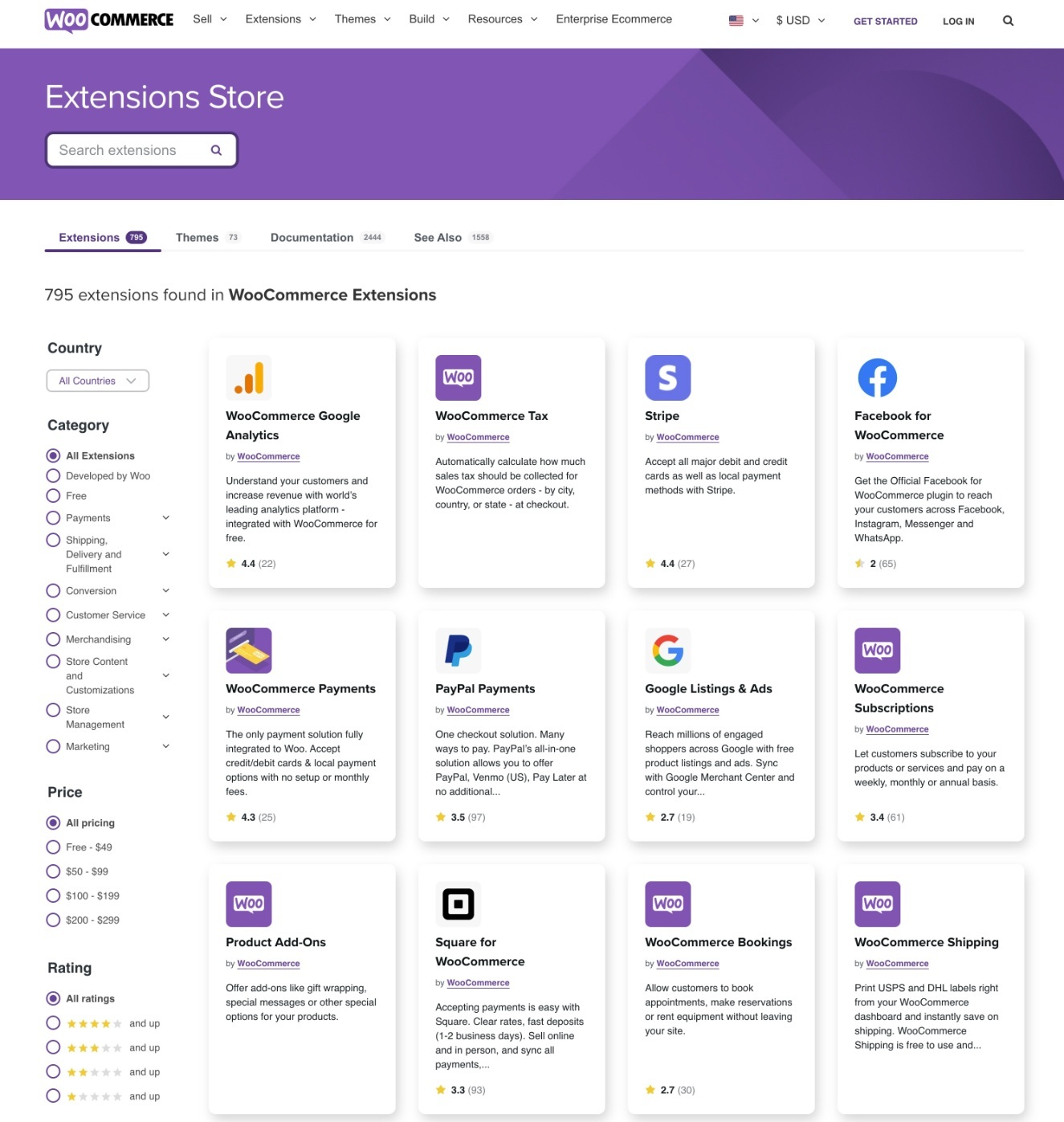
With Shopify, you’ll mainly get your apps from the official Shopify App Store. However, there is also an option to install custom apps from outside the Shopify App Store, though this approach is not as popular as it is with WooCommerce.

Custom Code Access / Customizations
While most people can access all of the customizations that they need using themes and plugins/apps, you might have some unique situations where you need a specific customization that’s not available in an off-the-rack solution.
In these cases, you might want to use your own custom code.
For adding custom code, WooCommerce is much more flexible and the clear winner.
Because it’s open-source, self-hosted software, WooCommece gives you full access to 100% of your site’s underlying code. You (or your developer) can edit any part of your store to create a truly custom solution.
Because Shopify is a closed-source SaaS tool, you don’t get full access to the code base. You can add custom code in some ways, such as adding custom HTML, CSS, and JavaScript to your Shopify theme. But you’ll never get the full flexibility that WooCommerce offers.
With that being said, Shopify Plus, Shopify’s more expensive enterprise-focused tool, does give you a lot more flexibility thanks in large part to its GraphQL Storefront API (among many other APIs). However, Shopify Plus plans start at around $2,000 per month, so you will pay for the privilege.
Still, it is worth remembering that Shopify Plus is a viable option for larger stores that need advanced customization needs.
For example, Shopify Plus is used by bigger brands like Allbirds, Brooklinen, and so on.
Payment Options / Transaction Fees
When it comes to processing payments, WooCommerce gives you more flexibility than Shopify.
With WooCommerce, you can find hundreds of payment gateway plugins for both big names like PayPal and Stripe as well as pretty much any local payment gateway. You’ll also find niche tools, such as various cryptocurrency payment gateways.
Or, for the simplest option, you can use WooCommerce Payments, which is powered by Stripe.
With Shopify, you do get access to a built-in Shopify Payments service as well as lots of payment gateway integrations.
There’s one big caveat with Shopify’s payment processing, though.
If you decide not to use Shopify Payments, Shopify will charge an extra payment processing fee on top of what your third-party payment provider charges.
This fee ranges from 2.0% to 0.5%, depending on your Shopify plan, which can really add up.
For example, let’s say you want to use Stripe on your store and you’re using the Shopify Basic plan, which adds a 2.0% fee.
Every time someone places an order with a credit card, you would need to pay $0.30 + 2.9% to Stripe plus 2.0% to Shopify, for a total of around 5%. That can really cut into your margins, so it’s an important consideration.
Search Engine Optimization (SEO)
Both WooCommerce and Shopify are more than capable when it comes to implementing foundation SEO strategies, though you’ll typically want the help of an SEO extension on both platforms:
- WooCommerce – you’ll want an SEO plugin like Yoast SEO or Rank Math.
- Shopify – you’ll probably want an SEO app like SEO Booster.
For the way that most average store owners implement SEO, you’re unlikely to notice any difference between Shopify vs WooCommerce SEO.
However, for more advanced SEO strategies, WooCommerce has a small edge because of the general flexibility that WooCommerce offers. For example, you could more easily implement programmatic SEO strategies on WooCommerce.
Again – for most average store owners, there’s no functional difference here, though.
Security
Both WooCommerce and Shopify can help you create a secure WooCommerce store that keeps your customers’ data safe.
However, Shopify is the clear winner when it comes to the ease of use of implementing those security principles.
With Shopify, you basically don’t even need to think about security because Shopify handles everything for you. That’s one of the biggest benefits of Shopify’s closed-source SaaS approach.
With WooCommerce, you’ll need to be a little more proactive about implementing security best practices on your site. For example, you’ll need to make sure you’re promptly applying software updates, you’ll need to make sure you’ve properly configured your SSL certificate and enabled HTTPS, and so on.
Do you need to be a tech expert to implement these security best practices on WooCommerce? Definitely not.
But handling security on WooCommerce is a little extra work and responsibility vs just using Shopify.
Blogging
Both WooCommerce and Shopify let you create a blog to market your store and connect with customers.
However, when it comes to blogging flexibility, WooCommerce is the clear winner because you get full access to all of the blogging tools in WordPress.
WordPress powers many of the most popular blogs in the world, so it’s well-suited to that use case.
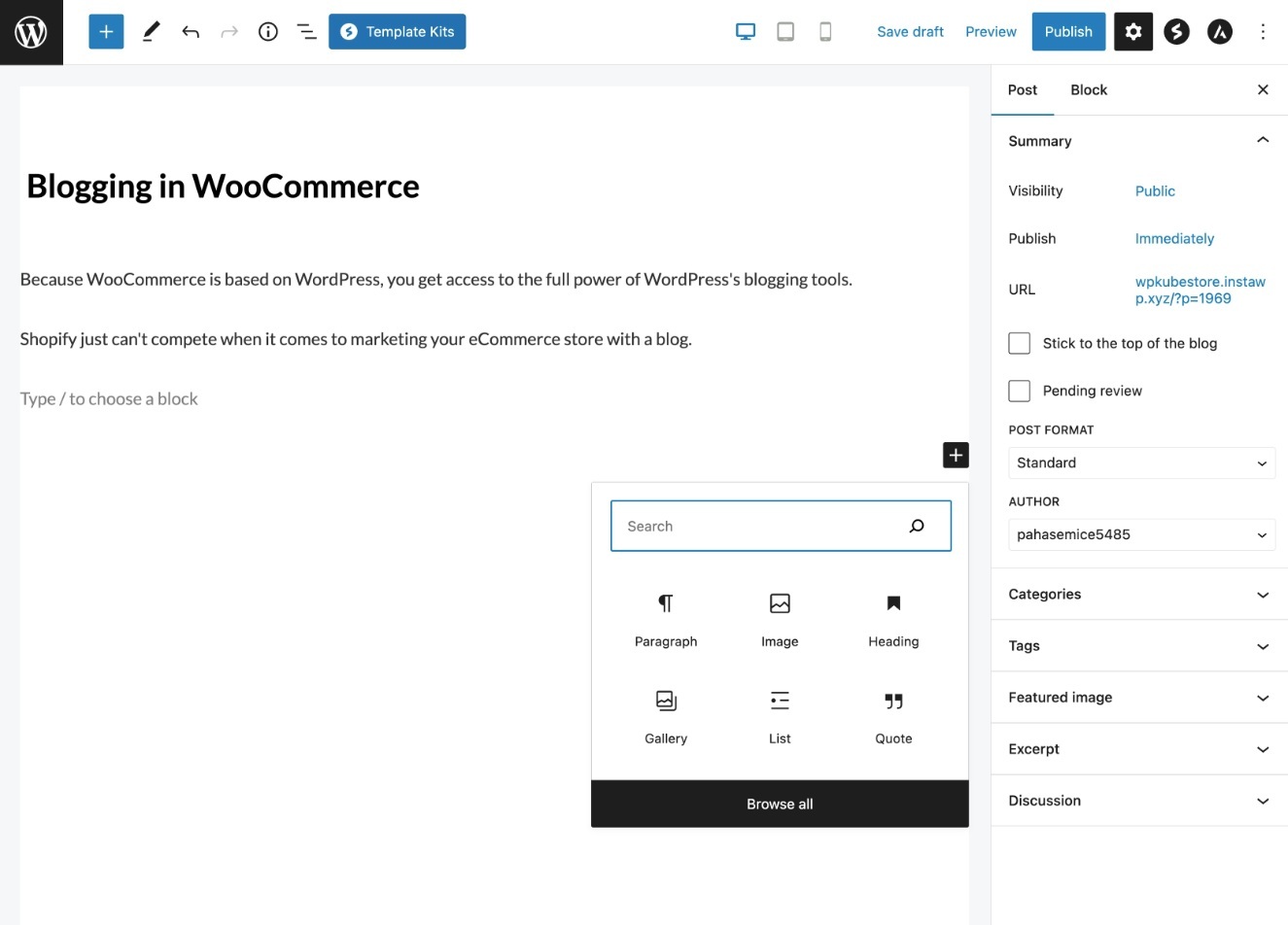
On the other hand, Shopify’s blogging tool is more limited. It’s totally fine if you just want to publish some basic blog posts, but it’s not ideal if you want to make your blog a core pillar of your marketing strategy.
For this reason, you’ll see a lot of Shopify stores still use WordPress for their blogs, which is another good option to consider.
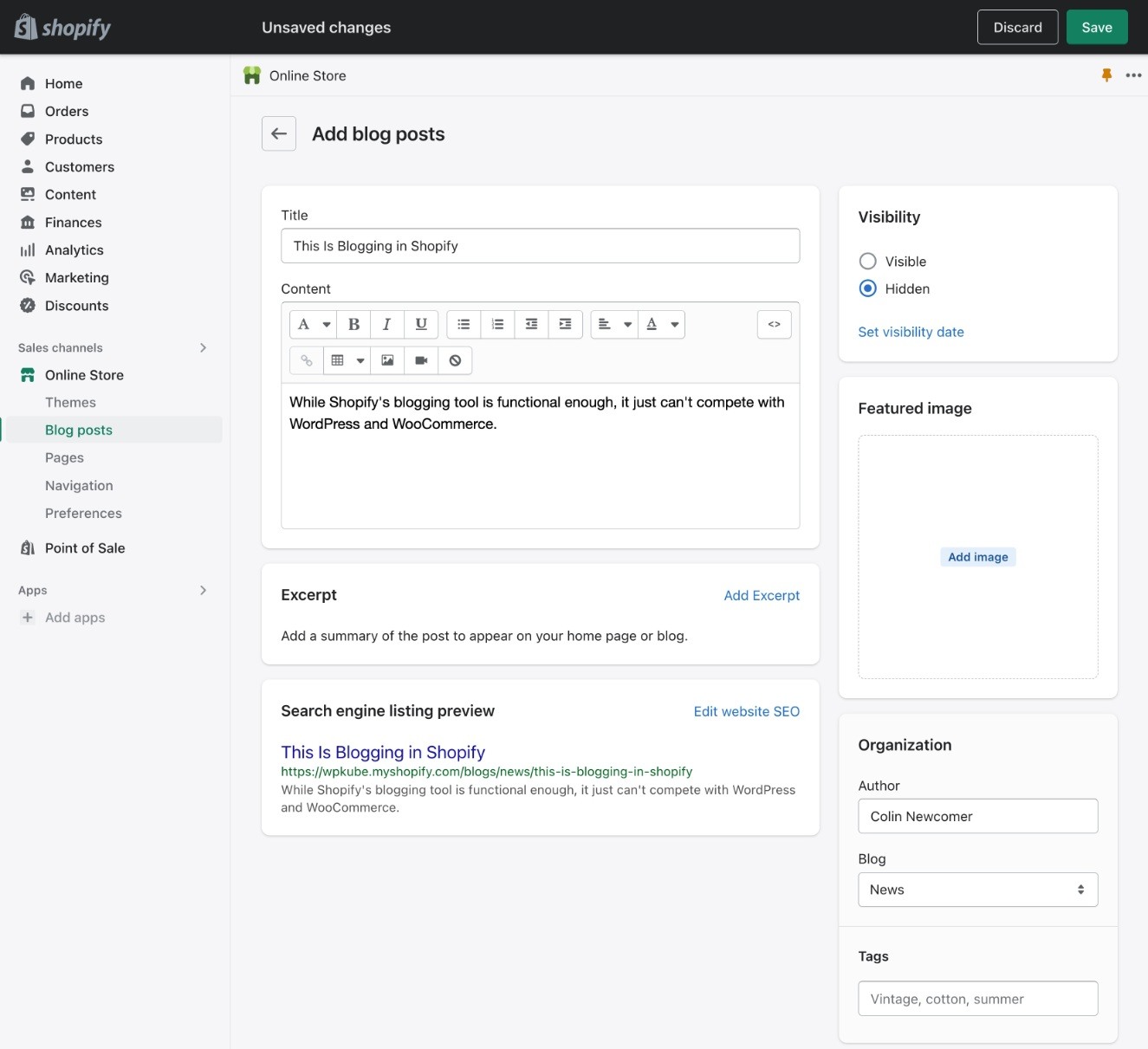
Customer Support
When it comes to customer support, Shopify is the clear winner.
Because WooCommerce is free, open-source software, there are no official one-on-one support channels for the core WooCommerce software.
Instead, you’ll need to rely on community support. While WooCommerce’s popularity means it is easy to find community help, it’s still not quite the same as getting one-on-one support directly from the developer.
Shopify, on the other hand, offers 24/7 support via live chat and email on all Shopify plans. Being able to reach out directly over live chat is something that you won’t get when you use WooCommerce.
With that being said, most paid WooCommerce extensions do offer official support from the developer (for that extension’s functionality). So, just because you don’t get one-on-one support with the core WooCommerce software, that doesn’t mean you won’t get help with any part of your store.
Still, Shopify is undoubtedly the better option if you want to always be able to reach out to support when you run into any issues.
Pricing
In general, WooCommerce stores can be cheaper than Shopify stores. So if you’re on a tight budget, that might make WooCommerce a better option.
However, this is not always the case and there might be some situations where Shopify ends up cheaper than WooCommerce.
To fully compare WooCommerce vs Shopify pricing, we need to break it down into a few different categories:
- Core software
- Theme
- Plugins/apps
WooCommerce vs Shopify Core Software Pricing
While the core WooCommerce software is 100% free, you will still need web hosting to power that software, which is not free.
What you pay for hosting will depend on how complex your store is, how many visitors your store receives, and how many orders your store needs to process.
In general, a good starting point for a basic WooCommerce store is around $20-$30 per month.
For example, if you look at Nexcess, one of the best WooCommerce hosting providers, you’ll find that the WooCommerce plans start at $19 per month to host a single store.
Or, WP Engine, another excellent option, has WooCommerce hosting plans that start at $29 per month (or $24 per month with annual billing).
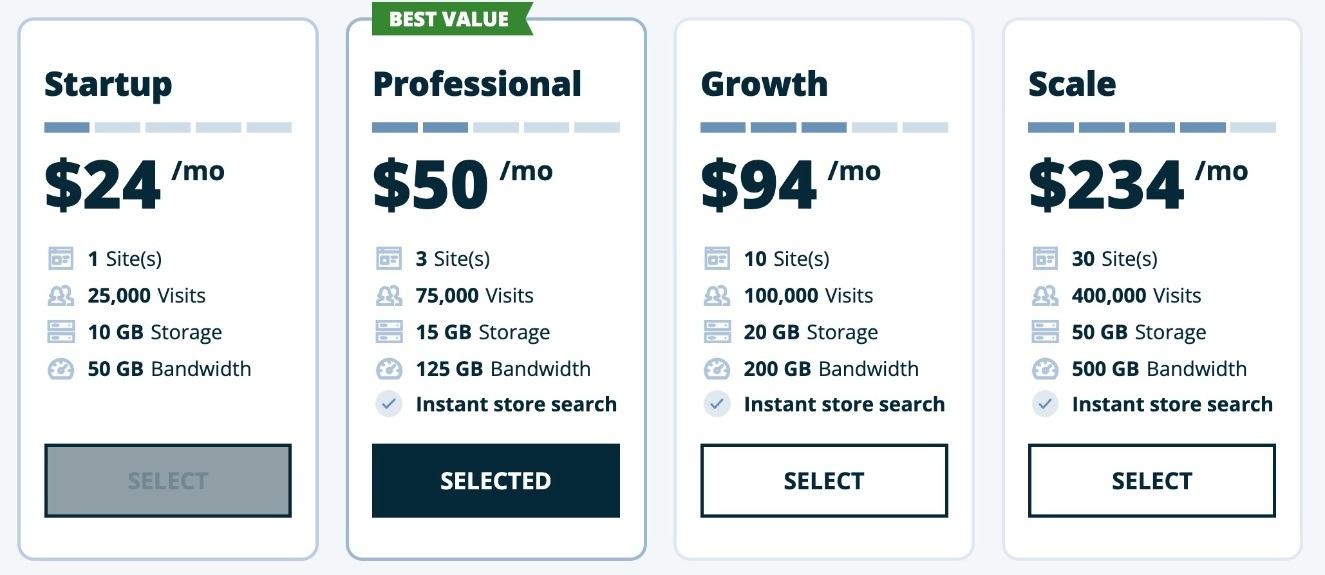
With Shopify, you don’t need to pay for separate hosting, but you do need to pay for the Shopify service.
Shopify’s regular plans start at $25 per month and range up to $399 per month.

If you need Shopify Plus, those plans start at $2,000 per month.
WooCommerce vs Shopify Theme Pricing
You can find free themes for both WooCommerce and Shopify, but most stores will probably want a premium theme for more design flexibility.
In general, WooCommerce themes are usually cheaper than Shopify themes.
Most WooCommerce themes cost around $60, whereas many of the Shopify themes at the official Shopify app marketplace are more in the $200-$300 range.
However, if you go to a third-party theme marketplace like ThemeForest, the difference is much smaller (though WooCommerce themes are usually still a little cheaper).
For example, here are the best-selling WooCommerce themes at ThemeForest:

And here are the best-selling Shopify themes at ThemeForest:

WooCommerce vs Shopify Plugin/App Pricing
When it comes to adding plugins and apps to your store, there’s a very important pricing difference that usually makes WooCommerce plugins a lot cheaper than Shopify apps.
With WooCommerce plugins, you usually pay a one-time fee for lifetime usage of the plugin, along with an optional renewal fee to continue receiving support and updates after the first year (though some WooCommerce plugins offer lifetime updates for no extra cost).
Shopify apps, on the other hand, use a recurring billing model. If you ever stop paying for the app on a monthly/yearly basis, you will immediately lose access to that app.
Because WooCommerce plugins are one-time fees (with optional renewals for new updates) and Shopify apps are recurring fees, WooCommerce plugins often work out to be a lot cheaper over the long run.
How to Choose Between WooCommerce vs Shopify
In the end, there’s no single winner when it comes to WooCommerce vs Shopify.
Both platforms have their own strengths and weaknesses. How those strengths and weaknesses apply to your unique situation will affect which eCommerce platform is better for your store.
Let’s start with Shopify…
When to Use Shopify
Shopify’s main selling point is that it offers all of the features and options that most stores need in a very simple, hands-off package.
You don’t need to worry about installing software, implementing security best practices, performing maintenance, and so on. Instead, you can just focus on growing your store.
While Shopify isn’t open-source software like WooCommerce, most stores can access more than enough functionality and flexibility via Shopify’s built-in options and the Shopify App Marketplace.
All this at a price point that doesn’t break the bank and can even be cheaper than WooCommerce in some situations.
Though again, it’s also possible to create a WooCommerce store that’s cheaper than Shopify.
If your store ever outgrows Shopify’s plans and needs more flexibility, you also always have the option to upgrade to Shopify Plus, which unlocks even more functionality via its many APIs.
Overall, for most “regular” eCommerce stores, Shopify is the best option.
When to Use WooCommerce
If Shopify is the best option for “regular” eCommerce stores, it naturally follows that WooCommerce can be the better option for stores that aren’t “regular”.
For more unique cases, WooCommerce’s open-source nature might be an advantage because of the added flexibility that it offers.
For example, maybe you want to offer some highly customizable “build your own products” and you can’t make Shopify do what you want. With WooCommerce, you can find a way to get the job done because you have access to everything.
WooCommerce can also be a good option if you find yourself bumping into some of Shopify’s arbitrary limits.
For example, Shopify only lets you have up to 100 variants per product. While that’s more than enough for most stores, maybe you have some unique use case where you need 150 product variants per product.
With WooCommerce, that’s no problem because you can make your store do whatever you want.
Or, maybe you really need to use your own payment gateway and you don’t like the idea of paying an extra fee just because you’re not using Shopify Payments. With WooCommerce, you can use whatever payment gateways you want at no extra cost.
Finally, there’s the price.
While WooCommerce stores certainly can be expensive, the fact that both the core WordPress and WooCommerce software are free means that WooCommerce still offers the absolute cheapest way to make a fully functioning eCommerce store.
So if your budget is super limited and you’re smart about which WooCommerce plugins you use, you can create a working store for very little money, which isn’t an option at Shopify.
Final Verdict
Overall, if I had to make one recommendation for the “average” person looking to make an eCommerce store, I would recommend starting with Shopify.
Most of WooCommerce’s advantages are for more advanced use cases and customization,
For the average eCommerce store, Shopify’s “it just works” approach is a better option.
WooCommerce vs Shopify FAQs
To finish out our Shopify vs WooCommerce comparison, let’s run over a few common questions you might have.
WooCommerce will often be cheaper than Shopify because the WooCommerce software is 100% free and WooCommerce themes/plugins are more affordable. However, this is not true for every single store and it is possible for some WooCommerce stores to cost more than Shopify.
The main reasons to use WooCommerce over Shopify are if you need the added flexibility that WooCommerce’s open-source approach offers and/or if you’re looking to keep your costs down.
One of the big advantages that Shopify has over WordPress is its simplicity. You don’t need to worry about maintenance, updates, security, and so on – you can just register for an account and start building your store.
Yes, it’s possible to migrate your store from WooCommerce to Shopify. You’ll be able to bring over most products and data.
Yes, it’s possible to migrate your store from Shopify to WooCommerce. You’ll be able to bring over most products and data.
Do you still have any questions about choosing between Shopify vs WooCommerce? Let us know in the comments.








Leave a Reply